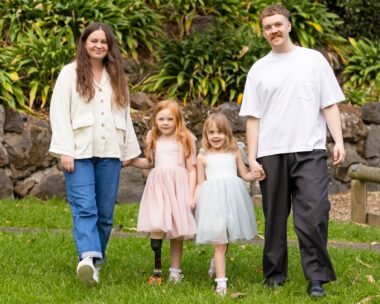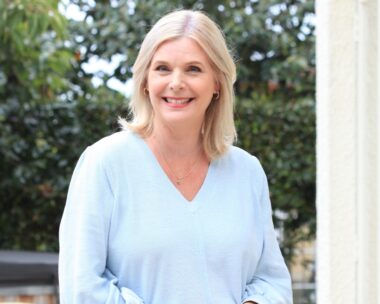As a child, Sophie Lister was blessed with a head of thick, lustrous hair. The teenage Sophie would often model for a cousin training to be a hairdresser and was known for her outrageous ’dos.
Her hair was, as they say, her crowning glory. But at 17, Sophie’s world began unravelling as her hair started falling out. Experiencing considerable stress at the time, she has since battled ongoing anxiety and depression, and spent thousands of dollars on products, treatments and specialists in the search for a cure.
Now 34, Sophie is speaking out about her struggle in the hope she can offer some comfort to other women facing similar challenges. Sophie has what’s called androgenic alopecia or female pattern hair loss (FPHL). It is characterised by progressive thinning – mostly from the front and top of the head, similar to what happens when males go bald – and has many triggers, along with some possible genetic links.

Aged nine, she had thick hair, and at 16, she was a hair model.
Although not as severe as alopecia universalis (complete hair loss) or alopecia areata (which causes the hair to fall out in patches), it is just as debilitating.
“I know there are a million illnesses out there that are worse and I’m thankful I don’t have a life-threatening or physically debilitating disease,” says Sophie. “But it’s something that impacts on me every day and in my experience, most professionals don’t understand the negative psychological effect it can have, especially on young women.”
Her hairdresser cousin noticed the first signs, pointing out that the hair at the front of Sophie’s head was looking thinner than usual.
“At certain times, I was pulling handfuls out. It was awful and so embarrassing. There have been periods where I’ve shed a lot and others where it has plateaued, depending on my stress levels and the treatments I’ve been on. But I’ve pretty much lost half a head of hair.”

By 18, Sophie’s hair was thinning out.
Having FPHL is not, she emphasises, anything like having “a bad hair day”.
At her best, Sophie will avoid mirrors or put on a hat when she goes out. At her worst, she’ll isolate herself, switching off the television – “every second advertisement has something to do with hair” – and sink into a world of self-loathing.
She asserts, “It has changed my life. There have been points where I’ve been in a very dark place. I avoid bright lights and I panic about going swimming or being caught in the rain because when my hair is wet, the loss is even more noticeable. I even turned down a job working on a yacht because of it.”
Stress, diet, hormone levels, certain drugs, iron deficiency and thyroid disease have all been linked to alopecia. The cause of Sophie’s has been described by specialists as “complex”, although she firmly believes it was triggered by coming off a particular contraceptive pill.

She has spent in excess of $10,000 over the years – on everything from laser caps to spray-in fibre, naturopaths, dermatologists and toxin detection – in her attempt to find a cause and a cure.
Sophie has even seriously considered shaving her head to be free of the burden and expense that comes with trying to maintain the hair she has. “It’s considered OK and even sexy for men to shave their heads,” she points out. “Why shouldn’t women feel the same confidence?”
Sophie recognises there’ll be those who consider her narcissistic or vain and that many women with total hair loss would, as she puts it, “love to have the hair I have”.
However, the physical and psychological effects can’t be dismissed, she says, adding that studies show some 50% of female hair-loss sufferers have contemplated suicide – something Sophie says she can personally relate to.
“Hair has defined women throughout history. It has become ingrained in society as an identity symbol – it’s considered a sign of health and vitality. Losing it makes me feel like there’s something wrong with me.
“I was known for having beautiful, thick hair. To look in the mirror and not be that person any more is hard.”
Having left her previous career as an occupational therapist working in mental health earlier this year, Sophie has since started new employment at an Auckland wig shop. “It has been eye-opening to see how many women struggle with this,” she tells. “I felt so alone for a long time.”

Reading about others going through the same struggles via the online US support group womenshairlossproject.com has helped and prompted her to create her own closed Facebook group for New Zealand women experiencing FPHL.
Explains Sophie, “The purpose of it is to share experiences, and offer each other help and guidance for what is a complex and often expensive problem to solve.
“My hope now is to raise awareness and help other women find a way forward, and to live courageously.”
For more information about hair loss, go to alopecianz.co.nz. The Government offers a grant to people who suffer from serious hair loss because of a medical condition or from certain cancer therapies. For details, check out this webpage.




